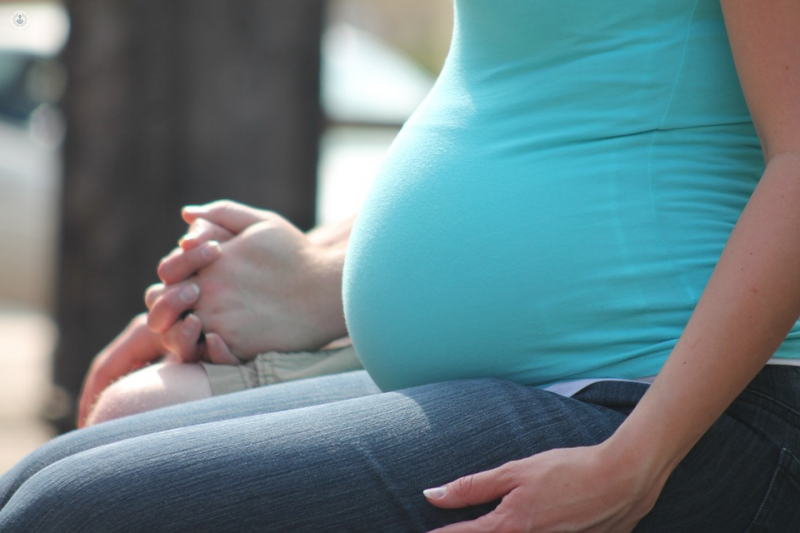
What are recurrent miscarriages?
Recurrent or repeated miscarriages are when a woman has miscarried on three or more consecutive pregnancies.
Miscarriage (also referred to as pregnancy loss) can be devastating if it happens once; sadly some individuals miscarry on multiple occasions, and if three or more consecutive pregnancies are lost a diagnosis of recurrent miscarriage can be made. At this point, further tests are often conducted to find what is causing the pregnancies to be lost.
Causes of recurrent miscarriage
There are several factors that can lead to repeated miscarriages:
- Genetic factors – in a small number of cases, one partner may be repeatedly passing on an abnormal chromosome that is causing the miscarriages.
- Hormonal – conditions like polycystic ovarian syndrome or imbalances in pregnancy hormones can be risk factors for miscarriage.
- Uterine problems – an abnormally-shaped womb, such as in a patient with bicornuate uterus increases the risk of miscarriage.
- Cervical weakness – if this is detected early, stitches or cervical cerclage may be recommended to reinforce the cervix.
- Blood clotting disorders – rare disorders like systemic lupus erythematosus and antiphospholipid syndrome affect the blood flow to the placenta. Clots may form, which can affect the function of the placenta and potentially starve the foetus of oxygen and essential nutrients, leading to miscarriage.
- Age – the older the parents, the lower the chance of carrying a baby to term.
Can miscarriages be prevented?
Most pregnancies are monitored to an extent, with most UK hospitals offering at least two ultrasound scans during a pregnancy, as well as regular prenatal check-ups. These measures often pick up irregularities in the pregnancy; however, if a woman suffers several miscarriages, a closer examination may be needed.
After recurrent miscarriages, certain tests and scans are usually offered to try to identify the problem. These tests include:
- Karyotyping – testing for chromosome abnormalities. This may involve testing the DNA of the foetus and both parents. If genetics are found to be responsible, a clinical geneticist will be able to go over options with the patients and explain if there are any fertility treatments, such as IVF, that could help.
- Ultrasound scans – these scans can detect abnormalities in the structure of the womb or weakness in the muscles of the cervix.
- Blood tests
If a cause is discovered, the doctors and patient can work to counter it to try to prevent further miscarriages. For instance, some blood clotting disorders can be treated with medication, while a weakened cervix can be strengthened with a small stitch of strong thread (cervical cerclage) carried out once the patient is pregnant again.
Measures such as maintaining a healthy weight and avoiding harmful substances including alcohol and tobacco also lower the risk of miscarriage.
02-26-2013 08-23-2023Recurrent miscarriage
Mr Rafet Gazvani - Fertility specialist
Created on: 02-26-2013
Updated on: 08-23-2023
Edited by: Aoife Maguire

What are recurrent miscarriages?
Recurrent or repeated miscarriages are when a woman has miscarried on three or more consecutive pregnancies.
Miscarriage (also referred to as pregnancy loss) can be devastating if it happens once; sadly some individuals miscarry on multiple occasions, and if three or more consecutive pregnancies are lost a diagnosis of recurrent miscarriage can be made. At this point, further tests are often conducted to find what is causing the pregnancies to be lost.
Causes of recurrent miscarriage
There are several factors that can lead to repeated miscarriages:
- Genetic factors – in a small number of cases, one partner may be repeatedly passing on an abnormal chromosome that is causing the miscarriages.
- Hormonal – conditions like polycystic ovarian syndrome or imbalances in pregnancy hormones can be risk factors for miscarriage.
- Uterine problems – an abnormally-shaped womb, such as in a patient with bicornuate uterus increases the risk of miscarriage.
- Cervical weakness – if this is detected early, stitches or cervical cerclage may be recommended to reinforce the cervix.
- Blood clotting disorders – rare disorders like systemic lupus erythematosus and antiphospholipid syndrome affect the blood flow to the placenta. Clots may form, which can affect the function of the placenta and potentially starve the foetus of oxygen and essential nutrients, leading to miscarriage.
- Age – the older the parents, the lower the chance of carrying a baby to term.
Can miscarriages be prevented?
Most pregnancies are monitored to an extent, with most UK hospitals offering at least two ultrasound scans during a pregnancy, as well as regular prenatal check-ups. These measures often pick up irregularities in the pregnancy; however, if a woman suffers several miscarriages, a closer examination may be needed.
After recurrent miscarriages, certain tests and scans are usually offered to try to identify the problem. These tests include:
- Karyotyping – testing for chromosome abnormalities. This may involve testing the DNA of the foetus and both parents. If genetics are found to be responsible, a clinical geneticist will be able to go over options with the patients and explain if there are any fertility treatments, such as IVF, that could help.
- Ultrasound scans – these scans can detect abnormalities in the structure of the womb or weakness in the muscles of the cervix.
- Blood tests
If a cause is discovered, the doctors and patient can work to counter it to try to prevent further miscarriages. For instance, some blood clotting disorders can be treated with medication, while a weakened cervix can be strengthened with a small stitch of strong thread (cervical cerclage) carried out once the patient is pregnant again.
Measures such as maintaining a healthy weight and avoiding harmful substances including alcohol and tobacco also lower the risk of miscarriage.


What is recurrent miscarriage?
By Mr Ibrahim Bolaji
2024-12-29
Recurrent miscarriage is an unfortunate condition which affects a small number of prospective parents. Mr Bolaji explains some of the reasons why it may it occur. See more


What are the most common causes of recurrent miscarriage?
By Dr Simone Rofena
2024-12-29
Leading senior consultant in obstetrics, gynaecology and reproductive medicine Dr Simone Rofena offers expert insight on the principal causes of recurrent miscarriage and the next steps for couples following repeated unsuccessful pregnancies in this detailed and informative article. See more


A discussion on recurrent miscarriage: part 1
By Mr Laxmikant Chaudhari
2024-12-29
Suffering from a miscarriage can have a devastating impact on couples, and repeated miscarriages can leave some couples feeling hopeless. In the first article of a two-part series, leading consultant gynaecologist Mr Laxmikant Chaudhari explores the prevalent causes of recurrent miscarriage, how they can be identified and how to address them. See more


Recurrent miscarriages: your questions answered
By Miss Petya Doncheva
2024-12-29
Recurrent miscarriages are rare but can have profound implications on the couple and their families. The couple want to know the reason for their losses and, if a treatable cause is found, to have a management plan for their next pregnancy. Early diagnosis and timely intervention can prevent further miscarriages. Miss Petya Doncheva, renowned consultant gynaecologist and fertility expert explains everything you need to know about recurrent miscarriages, including causes and diagnosis. See more
Experts in Recurrent miscarriage
-
Professor Yacoub Khalaf
Obstetrics & gynaecologyExpert in:
- Infertility
- Assisted reproductive technology
- Preimplantation Genetic Diagnosis
- Recurrent miscarriage
- Fibroids
- Polycystic ovary syndrome (PCOS)
-
Mr Rajendra Rai
Obstetrics & gynaecologyExpert in:
- Recurrent miscarriage
- Infertility
- In vitro fertilisation (IVF)
- Pregnancy
- Endoscopic surgery
- Uterine malformations
-
Dr Benjamin Abramov
Fertility specialistExpert in:
- Assisted reproductive technology
- Fertility test
- Egg freezing
- Recurrent miscarriage
- Preimplantation Genetic Diagnosis
- Egg donation
-
Professor Ying Cheong
Fertility specialistExpert in:
- In vitro fertilisation (IVF)
- Infertility
- Endometriosis
- Recurrent miscarriage
- Polycystic ovary syndrome (PCOS)
-
Miss Aruna Ramineni
Obstetrics & gynaecologyExpert in:
- Menopause
- Recurrent miscarriage
- Infertility
- Polycystic ovary syndrome (PCOS)
- Fibroids
- Menstrual disorders
- See all

London Gynaecology- The City of London
London Gynaecology- The City of London
15 Austin Friars, London EC2N 2HE, United Kingdom
No existe teléfono en el centro.
By using the telephone number provided by TOP DOCTORS, you automatically agree to let us use your phone number for statistical and commercial purposes. For further information, read our Privacy Policy
Top Doctors

The Parkside Suite Heatherwood
The Parkside Suite Heatherwood
Heatherwood Hospital, High Street, SL5 8AA, Berkshire
No existe teléfono en el centro.
By using the telephone number provided by TOP DOCTORS, you automatically agree to let us use your phone number for statistical and commercial purposes. For further information, read our Privacy Policy
Top Doctors

Oak Tree Clinic
Oak Tree Clinic
2A, Oak Tree Court Mulberry Drive, Cardiff Gate Business Park, Cardiff
No existe teléfono en el centro.
By using the telephone number provided by TOP DOCTORS, you automatically agree to let us use your phone number for statistical and commercial purposes. For further information, read our Privacy Policy
Top Doctors
-
London Gynaecology- The City of London
15 Austin Friars, London EC2N 2HE, United Kingdom, Central LondonExpert in:
- Miscarriage
- Cancer screening clinic
- Ultrasound
- Pregnancy
- Endometriosis
- Fibroids
-
The Parkside Suite Heatherwood
Heatherwood Hospital, High Street, SL5 8AA, Berkshire, AscotExpert in:
- General Surgery
- Orthopaedic surgery
- Plastic surgery, reconstructive and aesthetics
- Obstetrics and Gynaecology
- Ophthalmology
- Urology
-
Oak Tree Clinic
2A, Oak Tree Court Mulberry Drive, Cardiff Gate Business Park, Cardiff, CardiffExpert in:
- Minimal access surgery (keyhole surgery)
- Ultrasound
- Endometriosis
- Chronic diseases
- In vitro fertilisation (IVF)
- Fertility
- See all
- Most viewed diseases, medical tests, and treatments
- Tubal factor infertility
- PGT-A
- Complex endometriosis
- Fertility preservation
- Female infertility
- Ovulatory disorders
- Surrogacy
- PGT-M
- Menopause support
- Pelvic ultrasound








